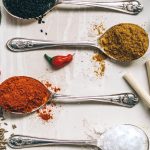There is one thing that you can guarantee all yoga teachers will share: a love of yoga. Apart from that, the only other thing you can guarantee is that they will be entirely different. And that’s what’s so great about them!
But, there is a clichéd view that if you’re a yoga teacher you should be a vegetarian (at the very least). You should also be a teetotal, green-juice quaffing, new-age hipster, wearing mala beads and smelling gently of incense.
And if you ARE exactly like that, then how 100% cool, but if you’re not, it doesn’t mean you’re any less of a yoga teacher. Or does it?
I gave up eating meat in my twenties, but when I fell pregnant I started eating it again as my body was craving meat. Now, with a fast metabolism and a busy and active life, I still eat meat occasionally, but I do question whether this is in line with the principles of yoga. And I know I’m not alone.
So, does it go against the principles of yoga to eat meat?
What the ancient texts say
Let’s go straight to the Granddaddy of Yoga – Patanjali. He codified the ground rules of yoga over 2,000 years ago, so if it’s important, it’ll be in there. After a thorough search I can guarantee that there is nothing specifically endorsing vegetarianism, but in the Sutras of Patanjali, Sutra II.30, it says:
‘Non-violence, truth, abstention from stealing, continence, and absence of greed for possessions beyond one’s need are the five pillars of yama’.
The principles of yama are guidelines of how to live your life according to yoga. Many yogis take the first principle of non-violence (ahimsa) as the grounds for being a vegetarian, as to them this means non-violence to all, including animals.
But what about non-violence, or kindness, to yourself? I know that for some metabolisms eating animal protein is the healthiest option.
What the modern-day yoga founders say
In Light on Yoga, BKS Iyengar states that “A vegetarian diet is a necessity for the practice of yoga”. However, just a few pages later he qualifies this statement, by saying, “Whether or not to be a vegetarian is a purely personal matter as each person is influenced by the tradition and habits of the country in which he was born and bred.”
This acknowledges the fact that being a vegetarian while being the norm in India, is a different kettle of fish (or meat – ha) when you’ve been brought up in the UK, or other Western countries with a varied diet of meat, fish, and vegetables.
T.K.V Desikachar, the son of T. Krishnamacharya, is emphatic in his view on the subject. In his book ‘Health, Healing and Beyond’ he states:
“Let me emphatically clear up one widespread misunderstanding. Nowhere in the Vedas or in the ancient teachings is it said that you must be a strict vegetarian.”
This is pretty clear. He feels strongly that according to the ancient yogis country of origin (see paragraph below), it is a matter of preference that they have a vegetarian diet, but for others, it is a choice the depends on beliefs, philosophy, culture, and taste.
What yoga’s country of origin ‘says’
Yoga has its source in India. In this great continent, the issue of vegetarianism is a complex one. Vegetarianism is a cultural issue that is interwoven into society through the religious beliefs and its accompanying caste system. The ranking of the caste system in India splits Hindus into four hierarchical sections of society: Brahmins, Kshatriyas, Vaishyas, and the Shudras. Roughly translated these are priests and teachers, warriors and rulers, farmers and traders, and labourers.
Those in the highest caste, Brahmins, are aiming to achieve purity in body and spirit, and it was believed this could only be achieved through a vegetarian diet. There is also the belief that some animals are associated with different gods, and are therefore revered and would never be eaten, such as the cow, who is seen as a sacred mother.
What the scientists say
My own teacher trainer, a very experienced senior Iyengar yoga teacher, was very impatient with vegetarianism, insisting that especially when doing intensive physical practice, the body needed the protein from eating meat.
For those of us exercising vigorously every day (and I occasionally include myself in that category) the capability of the body to increase muscle tissue, as well as repair damage to muscle, is enhanced by the absorption of proteins and other minerals, fats, and nutrients contained in meat and fish.
The NHS recommends a healthy, varied diet, including oily fish and lean meat in order to build up muscles, but does clarify that it’s not necessary to eat more protein than you would usually eat, as ‘not all the protein you eat is used to build new muscle. If you overeat protein, the excess will be used mostly for energy once your body has what it needs for muscle repair.’
However, Derek Tresize, (very aptly named, as he is virtually ‘tree-size’), is a vegan competition-winning body-builder, who is adamant that a plant-based diet is not only adequate to build muscle mass, but preferable, as he insists that from personal experience he has found that eating plants will provide all the essential nutrients needed to build healthy lean body mass.
What your own body says
BKS Iyengar’s daughter, Geeta Iyengar, an acclaimed teacher in her own right, says in her book, ‘Yoga: A Gem For Women’, that ‘it is important to notice the change that the practice of asanas brings. In the beginning, the appetite grows as digestion improves. Later the intake of food is reduced, without affecting energy.’
It’s certain that the practice of yoga has a direct effect on digestion and appetite. Any yoga teacher can confirm this as at the end of a yoga class, the peace and quiet of savasana is often interrupted with the gurgles of various stomachs having been awoken from their slumber.
Twists deeply massage the digestive organs, backbends make you hungry, inversions first thing in the morning help to get things moving along. As our yoga practice deepens and we become more sensitive and attuned to our bodies, we start to understand what it is that we really need to eat. Geeta again:
‘By regular practice, one’s own constitution guides one as to what is food and what is to be avoided in food.’
So perhaps, as my body prompted me to go back to eating meat, in time, I will find that I no longer need it anymore.













